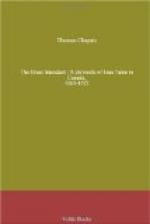The following incident will show to what lengths he was prepared to go when he thought that there was an encroachment of the spiritual on the civil power. The winter of 1667 was very gay at Quebec. Peace had been secured, confidence in the future of the colony was restored, and there manifested itself a general disposition to indulge in social festivities. Indeed the first ball ever given in Canada took place in February of this year at M. Chartier de Lotbiniere’s house, as is recorded in the Journal des Jesuites. Now there was at this time in Quebec a religious association for women called the Association of the Holy Family. Laval himself had framed their rules, one of which directed the members to abstain from frivolous entertainments and to lead a pious and edifying life amidst the distractions and dissipations of the world. Seeing that many members of the association had departed from the rules by taking part in these pleasures, Laval threatened to suspend their meetings. Naturally a strong impression was made on the public mind. Talon resented what he deemed an undue interference. He laid a complaint against the bishop’s action before the Sovereign Council and asked that two of their number be directed to report on the social entertainments held during the last carnival, in order to show that nothing improper had taken place. When the report was made, it declared that nothing deserving of condemnation had occurred in these festivities, and that there was no occasion to censure them. Evidently, if there was encroachment upon this occasion, it was encroachment of the civil on the spiritual power. The special rules of a pious association in no way affected the safety of the state or public order. If a number of ladies wished to join its ranks and accept its discipline in order to follow the path of Christian perfection and lead a more exemplary life in the world, they should be free to do so, and their directors should be free to remonstrate with them if they were not faithful to their pledge. In this incident the intendant was not at his best. He seems to have sought an occasion of checking the bishop’s authority, and the occasion was not well chosen. It is likely that M. de Tracy, still in the colony at the time, intervened in the interests of peace, for the entry in regard to Talon’s complaint was erased from the register of the Sovereign Council.
In a state paper by Talon for Colbert’s information, in 1669, the intendant’s Gallican views reveal themselves fully. He complains of the excessive zeal of the bishop and clergy which led them to interfere in matters of police, thus trespassing upon the province of the civil magistrate. He went on to say that too strict a moral discipline of confessors and spiritual directors put a constraint on consciences, and that, in order to counterbalance the excessive claims to obedience of the clergy then in charge, other priests should be sent to Canada with full powers for administration of the sacraments. It is more than probable that in writing these lines Talon was thinking of the vexed question of the liquor traffic, always a source of strife between the civil and the spiritual authorities.




